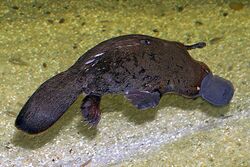Biology:Ornithorhynchidae
| Ornithorhynchidae | |
|---|---|

| |
| Platypus | |
| Scientific classification | |
| Domain: | Eukaryota |
| Kingdom: | Animalia |
| Phylum: | Chordata |
| Class: | Mammalia |
| Order: | Monotremata |
| Family: | Ornithorhynchidae Gray, 1825 |
| Genera | |
The Ornithorhynchidae /ɔːrˌnɪθəˈrɪŋkɪdiː/ are one of the two extant families in the order Monotremata, and contain the platypus and its extinct relatives. The other family is the Tachyglossidae, or echidnas. Within the Ornithorhynchidae are the genera Monotrematum, Obdurodon, and Ornithorhynchus:
- Family Ornithorhynchidae
- Genus † Monotrematum
- †Monotrematum sudamericanum
- Genus †Obdurodon — an ancient branch of the platypus family
- Genus Ornithorhynchus
- Ornithorhynchus anatinus (the modern platypus)
- Genus † Monotrematum
Another two genera, Steropodon and Teinolophos, were originally thought to belong to the Ornithorhynchidae. However, they were both placed into a new family, the Steropodontidae.[1] This decision was made based on differences in the dentary recovered from the Griman Creek Formation, Lightning Ridge, New South Wales, Australia. This dentary is the holotype for the genus Steropodon, thus the lack of information led to the original misclassification. Further research on Teinolophos has indeed shown it to be an animal much different from ornithochrynchids, lacking a beak, possessing a more complete mammalian dentition, and retaining primitive ears connected to the jaw as in more basal mammals.[2] In 2022 it was proposed to move Steropodon into its own family, Teinolophidae.[3]
The extinct Ornithorhynchus maximus has been included in Ornithorhynchus, but later placed with the echidna family Tachyglossidae as Zaglossus robustus.[4]
References
- ↑ Flannery, Timothy F.; Archer, Michael; Rich, Thomas H.; Jones, Robert (5 October 1995). "A new family of monotremes from the Creataceous of Australia". Nature 377 (6548): 418–420. doi:10.1038/377418a0. Bibcode: 1995Natur.377..418F.
- ↑ Thomas H. Rich, James A. Hopson, Pamela G. Gill, Peter Trusler, Sally Rogers-Davidson, Steve Morton, Richard L. Cifelli, David Pickering, Lesley Kool, Karen Siu, Flame A. Burgmann, Tim Senden, Alistair R. Evans, Barbara E. Wagstaff, Doris Seegets-Villiers, Ian J. Corfe, Timothy F. Flannery, Ken Walker, Anne M. Musser, Michael Archer, Rebecca Pian and Patricia Vickers-Rich (2016). "The mandible and dentition of the Early Cretaceous monotreme Teinolophos trusleri". Alcheringa: An Australasian Journal of Palaeontology. in press. doi:10.1080/03115518.2016.1180034.
- ↑ Flannery, T. F.; Rich, T. H.; Vickers-Rich, P.; Ziegler, T.; Veatch, E. G.; Helgen, K. M. (2022). "A review of monotreme (Monotremata) evolution". Alcheringa: An Australasian Journal of Palaeontology 46: 3–20. doi:10.1080/03115518.2022.2025900.
- ↑ Musser, A. M. (2003). "Review of the monotreme fossil record and comparison of palaeontological and molecular data". Comparative Biochemistry and Physiology A 136 (4): 927–42. doi:10.1016/s1095-6433(03)00275-7. PMID 14667856.
- Groves, C.P. (2005). Wilson, D.E.; Reeder, D.M.. eds. Mammal Species of the World: A Taxonomic and Geographic Reference (3rd ed.). Baltimore: Johns Hopkins University Press. p. 2. ISBN 0-801-88221-4. OCLC 62265494. http://www.departments.bucknell.edu/biology/resources/msw3/browse.asp.
Wikidata ☰ Q21811 entry
 |

